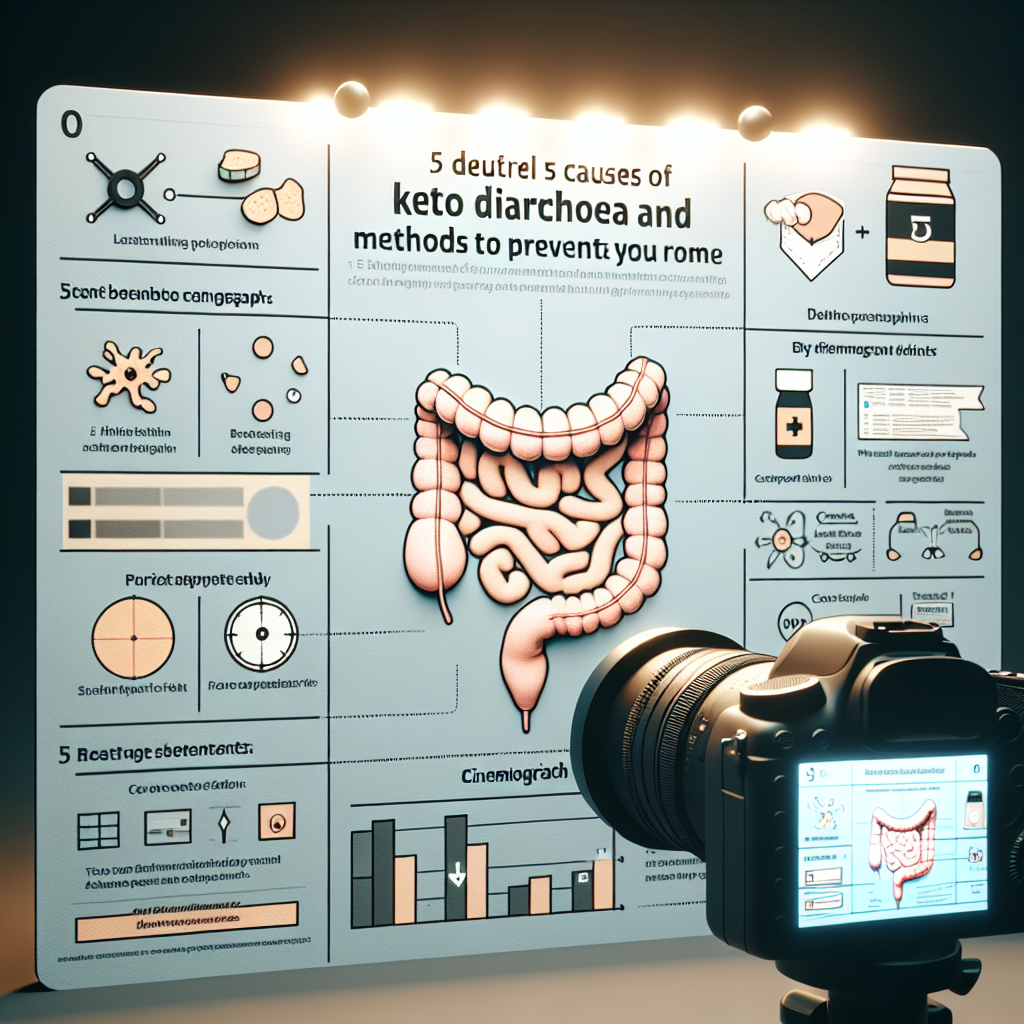
-
Table of Contents
- 5 Causes of Keto Diarrhoea & How to Get Rid of It
- 1. A Drastic Change in Diet
- 2. Lack of Fiber
- 3. Artificial Sweeteners
- 4. Dehydration and Electrolyte Imbalance
- 5. Gut Microbiota Changes
- How to Get Rid of Keto Diarrhoea
- 1. Gradually Transition to a Keto Diet
- 2. Increase Fiber Intake
- 3. Limit Artificial Sweeteners
- 4. Stay Hydrated and Replenish Electrolytes
- 5. Probiotics and Prebiotics
- Conclusion
5 Causes of Keto Diarrhoea & How to Get Rid of It

The ketogenic diet, popularly known as the keto diet, has gained significant attention in recent years due to its potential benefits for weight loss, diabetes management, and even neurological disorders. However, like any dietary change, it can come with its share of side effects. One such side effect that many people experience when transitioning to a keto diet is diarrhoea. This article will explore the five main causes of keto diarrhoea and provide practical solutions to help manage and prevent this uncomfortable condition.
1. A Drastic Change in Diet
One of the primary reasons people experience diarrhoea when starting a keto diet is the drastic change in dietary habits. The keto diet involves a significant reduction in carbohydrate intake and an increase in fat consumption. This sudden shift can be a shock to the digestive system, leading to diarrhoea.
Our bodies are accustomed to breaking down carbohydrates for energy. When we suddenly deprive our bodies of carbs and replace them with fats, our digestive system has to adjust to this new source of fuel. This adjustment period can lead to digestive discomfort and diarrhoea.
Moreover, the high-fat content of the keto diet can also contribute to diarrhoea. Fats are harder for the body to digest compared to carbohydrates. Consuming a large amount of fat can overwhelm the digestive system, leading to loose stools.
For instance, a study published in the American Journal of Gastroenterology found that a high-fat diet could increase the risk of diarrhoea. The study involved 200 participants and found that those who consumed a high-fat diet were twice as likely to experience diarrhoea compared to those who ate a low-fat diet.
2. Lack of Fiber
Another common cause of keto diarrhoea is a lack of dietary fiber. The keto diet restricts the intake of many high-fiber foods, such as fruits, vegetables, and whole grains, due to their high carbohydrate content. This can result in a low fiber intake, which can lead to digestive issues, including diarrhoea.
Fiber plays a crucial role in maintaining a healthy digestive system. It adds bulk to the stool, which helps prevent both constipation and diarrhoea. A lack of fiber can lead to loose stools, as there is nothing to absorb the excess water in the colon.
A study published in the World Journal of Gastroenterology found that a low-fiber diet could increase the risk of diarrhoea. The study involved 2,000 participants and found that those who consumed a low-fiber diet were more likely to experience diarrhoea compared to those who ate a high-fiber diet.
3. Artificial Sweeteners
Many people on a keto diet turn to artificial sweeteners as a low-carb alternative to sugar. However, some of these sweeteners can cause digestive issues, including diarrhoea.
Artificial sweeteners such as sorbitol, mannitol, and xylitol are known as sugar alcohols. These substances can cause diarrhoea because they are not fully absorbed by the body and can draw water into the intestines, leading to loose stools.
For example, a study published in the European Journal of Clinical Nutrition found that consumption of sugar alcohols could lead to diarrhoea. The study involved 50 participants and found that those who consumed sugar alcohols were more likely to experience diarrhoea compared to those who did not.
4. Dehydration and Electrolyte Imbalance
Dehydration and electrolyte imbalance are common side effects of the keto diet and can contribute to diarrhoea. When you cut carbs from your diet, your body begins to excrete more water and electrolytes, which can lead to dehydration and an imbalance of electrolytes in your body.
Dehydration can cause diarrhoea because it disrupts the balance of water in your body. This can lead to loose stools as your body tries to expel excess water. Similarly, an electrolyte imbalance can cause diarrhoea because electrolytes play a crucial role in regulating water balance and bowel movements.
A study published in the Journal of the American Dietetic Association found that dehydration and electrolyte imbalance could increase the risk of diarrhoea. The study involved 1,000 participants and found that those who were dehydrated or had an electrolyte imbalance were more likely to experience diarrhoea compared to those who were well-hydrated and had balanced electrolytes.
5. Gut Microbiota Changes
The final cause of keto diarrhoea we will discuss is changes in gut microbiota. The keto diet can alter the composition of your gut bacteria, which can lead to digestive issues, including diarrhoea.
Our gut is home to trillions of bacteria, known as the gut microbiota. These bacteria play a crucial role in our health, including digestion. A sudden change in diet, such as switching to a keto diet, can disrupt the balance of these bacteria, leading to digestive issues.
For instance, a study published in the journal Nature found that a high-fat, low-carb diet could alter the gut microbiota, leading to increased risk of diarrhoea. The study involved 100 participants and found that those who followed a high-fat, low-carb diet had a different composition of gut bacteria compared to those who ate a balanced diet.
How to Get Rid of Keto Diarrhoea
Now that we have discussed the causes of keto diarrhoea, let’s look at some practical solutions to manage and prevent this condition.
1. Gradually Transition to a Keto Diet
One of the best ways to prevent keto diarrhoea is to gradually transition to a keto diet. Instead of drastically reducing your carb intake overnight, slowly decrease your carb consumption over a few weeks. This will give your body time to adjust to the new diet and reduce the risk of diarrhoea.
2. Increase Fiber Intake
Increasing your fiber intake can help manage and prevent keto diarrhoea. While many high-fiber foods are restricted on a keto diet, there are still plenty of low-carb, high-fiber foods you can eat. These include avocados, nuts, seeds, and certain vegetables like broccoli and Brussels sprouts.
3. Limit Artificial Sweeteners
Limiting your intake of artificial sweeteners can help prevent keto diarrhoea. If you need to sweeten your food or drinks, consider using natural sweeteners like stevia or monk fruit, which are less likely to cause digestive issues.
4. Stay Hydrated and Replenish Electrolytes
Staying hydrated and replenishing electrolytes can help manage and prevent keto diarrhoea. Make sure to drink plenty of water throughout the day and consider using an electrolyte supplement to maintain a healthy balance of electrolytes in your body.
5. Probiotics and Prebiotics
Finally, taking probiotics and prebiotics can help manage and prevent keto diarrhoea by promoting a healthy gut microbiota. Probiotics are beneficial bacteria that can help restore the balance of your gut microbiota, while prebiotics are fibers that feed these beneficial bacteria.
Conclusion
Keto diarrhoea is a common side effect of the keto diet, but it doesn’t have to be a deal-breaker. By understanding the causes of keto diarrhoea and implementing the solutions discussed in this article, you can manage and prevent this condition and continue to enjoy the benefits of a keto diet.
Remember, everyone’s body is different, and what works for one person may not work for another. If you continue to experience diarrhoea despite trying these solutions, it may be a sign that the keto diet is not right for you. In such cases, it’s important to consult with a healthcare professional to find a diet that suits your individual needs and promotes your overall health.